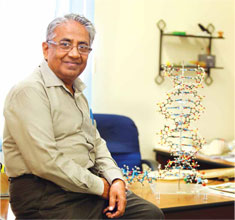
“There has been a huge change, more as a lucrative career choice than it was before because the importance of bioinformatics has enhanced significantly with big data and the genomics programme. Bioinformatics has become extremely relevant and trained manpower in this sector has become extremely important. Perhaps IBAB is the only institute in the country that has been catering to genomics data analysis...”
Tucked away inside Bangalore’s buzzing IT corridor at Electronics City, the Institute of Bioinformatics and Applied Biotechnology (IBAB), was an ‘idea’ that rode the ‘hype’ wave around the biotechnology (BT) sector in the early 2000s. The perception that the BT industry could grow the way the IT industry had instilled a ‘wow’ factor around bioinformatics which gained some momentum around 2002, with the global initiation of human genome sequencing. The belief that bioinformatics could chart a bio-flavoured IT sector and with IT being a highly head count-based industry; the need for manpower resourcing was envisaged in the BT sector too. Despite the excitement generated around the sector, there were hardly any biotech start-ups. The latent demand for training and manpower development in this sector came to the fore when Karnataka’s vision group on biotechnology, chaired by Dr.Kiran Mazumdar Shaw, Founder and CMD, Biocon Group, Bengaluru, proposed to the Karnataka CM, the need to create an institute to cater to this sector. With an overall mission to help grow the BT industry, IBAB was promoted as an initiative of the IT, BT and the Science and Technology (S&T) departments. IBAB was constituted as a non-profit academic and research institution in a joint venture of the Government of Karnataka (GoK) with financial support from ICICI Bank. The institute has gradually become an important institute for research, learning and entrepreneurship in areas related to bioinformatics and biotechnology (BT). IBAB started out in January 2001, occupying 13,000 sq.ft. In a mall set up at Bengaluru’s ITPL area. It today occupies 1, 00,000 sq. ft. under its management with the main building extending across 30,000 sq ft. Following its relocation in 2009, to the current 20 acre campus at Electronics City, the single laboratory and the small corner space rented at the ITPL mall has transformed not just physically by way of infrastructure and amenities but aims to catalyse the growth of bioinformatics and BT in India. The BT sector has in the past decade taken on new wings, with new bio startups and incubation zones implementing applications in healthcare, medicine, environmental sciences and industry.
Carrying the beacon forward is Dr. N. Yathindra, Director IBAB, Bengaluru, along with eminent governing body members, Prof. H. Sharat Chandra, Chairman, IBAB. Prof. Sharat Chandra is also Director, Centre for Human Genetics; Emeritus Professor, Indian Institute of Science and Honorary Professor at the Jawaharlal Nehru Centre for Advanced Scientific Research (JNCSR). Other prominent personalities include Prof. Sushil Vachani, Director, Indian Institute of Management, Bengaluru and Dr. Kiran Mazumdar-Shaw, Founder and CMD, Biocon Group.
Prof. N.Yathindra holds a Ph.D from the Centre of Advanced Study in Biophysics, University of Madras. He chaired the School of Physical Sciences and was Dean (Academic) at the University of Madras. He accomplished his post doctoral work at the University of Wisconsin and is a Fellow of the Indian Academy of Sciences. His research involved computational approaches to studying structure and function of biological macromolecules. He is also one of the ex-officio directors of the Bangalore Bioinnovation Centre (BBC), under the GoK. He spoke to Corporate Citizen on IBAB’s future goals, the global scenario in the sector and the edge that IBAB could create as a result of its collaborations with industry and academia; also, on the scope of synthetic biology programme at IBAB that has been recently sanctioned by the government of Karnataka. Dr. Gayatri Saberwal, Faculty Scientist and Dean, Academic Affairs and eminent faculty, Prof. H. Subramanya, provided important inputs on the way forward for IBAB
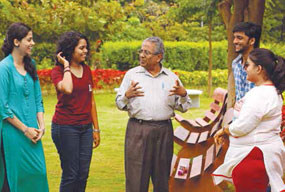
Dr. Yathindra (team): Yes, the biotech sector started with much hype. When you have hype, the reality is something else; but the hype helps create the reality. Because the perception that the BT industry could grow the way the IT industry had, especially around 2002 when news was being covered on human genome sequencing - the belief that bioinformatics could be a bio-flavoured IT, took shape. IT being a head count based industry; a similar pattern in bioinformatics was also envisaged. This prompted initiatives from the Govt of Karnataka via its vision group on BT which is chaired by Dr Kiran Mazumdar Shaw. Recommendations were made to the CM and in a sense Dr. Kiran and her colleagues were responsible for the creation of IBAB which has been modelled after IIIT-Bangalore. IIIT-B, at the time was called Indian Institute of Information Technology (now International Institute of Information Technology). It was set up by the GoK. IIITs in other states have been set up by MHRD and these were established to create manpower. In fact, the formation document of IBAB was simply those documented for IIITs with certain phrases changed. We have the most eminent governing body; Director - IIM, Director- National Centre for Biological Sciences (NCBS), Director –IIIT-B, Director- JNCSR, former Associate Director of IISC, representatives of the GoK (Secretary and the Directorate in the Department of ITBT) and Dr.Kiran Mazumdar Shaw, as the industry representative. With these changes, the department of IT was gradually converted to the Department of IT&BT and more recently is called the Department of ITBT and S&T (Science and Technology). Everyone wondered why biotechnology was being clubbed with IT. It was perceived to be a more active department and they felt that BT is likely to grow like IT and so they renamed the department itself. This transgression happened around 2001-2002, and so we were not put under health, but under ITBT and S&T
Dr. Yathindra: When hype is generated as it did with the biotech sector, more funds get created and people take interest in these subject fields .It might not completely satisfy what is intended but, the hype is necessary. For example, to create an excitement, to take on many people and get people to take on these subjects as it did with cancer cure in the late, 70s. With huge fund allocations, we have unravelled so many types of cancer in terms of heterogeneity and other aspects. We are able to tackle at least one by one...Hype is perhaps a necessary stimulant to focus on a particular issue.
Dr. Gayatri Saberwal: One of my 2014 study cohorts was based on 50 bio-medical startups, which were all established for less than 5 years then. Until then, these start-ups did not exist but the hype helped create them. If you think back 15-20 years ago, nobody thought of biosciences which was much lower in the pecking order in comparison to Physics, Math and Chemistry. But, today biotech is a big buzzword and we were created as part of that hype.
“We have our unique course in terms of it being a dual degree programme that is very relevant to industry. The practical transdisciplinary training is inclusive of students from multiple disciplines such as biology, physics, and statistics to computers. This is a very unique feature of IBAB’s education”
Dr. Yathindra (Team): The funding model was the same as the IIITs (under the MHRD). It was the GoK and ICICI Bank, who put in 5 crore each to seed it and thereafter we were supposed to be self financing. That was the time when public private partnership (PPP) as a concept was a rage but hadn’t really been road tested. Neither the IIIT models, nor IBAB has been self financing in that way. The GoK has been like a brick and have been supporting us all through. ICICI was a one time commitment and they disbursed an interest free deferred loan which we are currently paying back. In another three to four years we would have completely paid up this borrowing.
Dr. Yathindra (team): In 2004, we were one of five co-founders of the National Entrepreneurship Network. As part of that, the Wadhwani Foundation provided almost Rs.1 crore. In 2007, the Department of Electronics and IT (Deity), Govt. of India, gave us the 'Centre of Excellence' tag, with several crores of funding, for 5 years. In 2014, the Infosys Foundation established the Infosys Chair, currently occupied by Dr C M Gupta (former Director, CDRI, Lucknow and former Director, IMTECH, Chandigarh) that has funded the study on 'New drug target discovery and drug targeting in parasitic infections and cancer'. In 2015, we signed a MoU with InStem and NCBS for research and training in Big Data. As part of that MoU, 5 graduating students go to the NCBS-InStem campus each year to work on big data-related research projects. The funds also support ongoing work at IBAB. Kiran Mazumdar- Shaw has supported IBAB strongly, both through funding and continues to do so through various means.
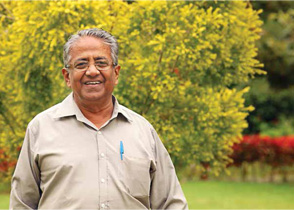
Dr. Yathindra: I joined IBAB in September 2004, after my first innings at the University of Madras. I have gained enormous satisfaction through my experiences with IBAB. I was sitting in a hole in Madras University but here, opportunities for me has been unlimited; not just teaching and research. Actually when I took over this place, I felt like a primary school headmaster. I was the Dean of Madras University and this was a 2 room space in ITPL when I joined. But, everybody has a role to play. When we shifted to the new campus in 2009, I initiated a whole lot of other things which I never thought I was capable of and have taken up roles as civil engineer, architect and even landscaping of the new campus. This is the characteristic of an entrepreneur. You are forced to do so many things and have become a good manager of funds. I have cherished my roles in developing the GANIT lab. The institute has contributed enormously to developing a Bangalore Bio-innovation centre (BBC), which I never thought I had the capacity to do. We have a 49 percent stake in BBC, and I am one of the directors. BBC is a Sec 25 company and I am supposed to play an ex-officio role here which is completely different from the hat I wear at IBAB. I consider my contribution in bringing in eminent faculty from CDRI, Infosys and IMTEC, Chandigarh to IBAB as noteworthy too.
Dr. Gayatri Saberwal: I have been with the institute since 2001. Our first director, Prof. Manju Bansal joined in September-October, 2001. She was from IISC (Indian Institute of Science, Bangalore) and came to us for three years. It took them some time to find a director as it is not an easy area even today to find a director in this field as computational biology is a rare skill in India and abroad. That is why IBAB exists - to create this manpower. IBAB is chaired by Prof. Sharat Chandra who retired from IISC. Although Dr Kiran is on our governing body, she is not the Chair. It is the onus of the Chair of the governing body to select the Director of IBAB, along with a selection committee of all the directors and two state government representatives on the board of the governing body.
“The institute has contributed enormously to developing a Bangalore Bio-innovation centre (BBC), which I never thought I had the capacity to do. We have a 49 percent stake in BBC, and I am one of the directors. BBC is a Sec 25 company and I am supposed to play an ex-officio role here which is completely different from the hat I wear at IBAB”
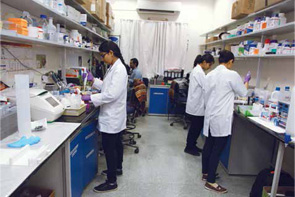
Dr. Yathindra (team): The BBC is a state of the art incubation centre that has been created to cater to the needs of start-ups in broad areas of Life Sciences such as iHealthcare (MedTech/ Pharma/ Bio-Pharma), Agriculture, Food/ Nutrition, Industrial Biotechnology and Environmental Biotechnology. A part of the Karnataka Bio Tech and IT services department (KBITS) along with Dr.Kiran Mazumdar Shaw manage BBC. KBITS also funds IBAB. However, we are far more autonomous. We have very strongly mentored the big incubation centre right next to our campus - the BBC (Bangalore Bio innovation Centre), spread over a 60,000 sq ft of built up area. They had 16 incubates currently and another 16 startups can be accommodated there, which is under process. We help by mentoring and anchoring their activities. Dr. Yathindra personally supervised the construction of that building while our faculty selected Rs.20 crore worth of equipment for them. We have done a lot of ground work for that centre. BBC took its first incubates in Dec 2015. More than Rs.50 crore has been spent on this centre.
Dr. Yathindra:There has been a huge change, more as a lucrative career choice than it was before because the importance of bioinformatics has enhanced significantly with Big Data and the genomic programme. Bioinformatics has become extremely relevant and trained manpower in this sector has become extremely important. Perhaps IBAB is the only institute in the country that has been catering to genomics data analysis. We started this training programme in 2011 with the support from the DBT who helped us to procure an esteemed faculty in Dr Subhashini Srinivasan, under the Ramalinga swamy Fellowship.
Dr. Yathindra: There is a huge difference in the kind of technical training that we provide in bioinformatics now and what we did a decade ago. For example, we teach and provide hands-on training in the area of genomics which includes whole genome analysis, transcriptome analysis, ChiP-seq analysis etc. Likewise training in microarray data analysis is also provided. This data is humongous considering that it is at the genomic level rather than at the individual gene or protein level. Students have to learn new algorithms and have to know more statistics to do reliable and valuable analysis. They necessarily undergo training in statistics and R language programming in addition to other computer programming capabilities which include Linux, Shell scripting, C, Perl, C++, Java, MySQL and HTML. These are constantly upgraded to meet the needs of life science industry and academia. We hope to start a Postgraduate Diploma in Big Data Biology from 2017 onwards.
Prof. H. Subramanya: This is the age of information and tonnes of data get generated. One of the areas is genomics which can have a direct impact on public health because treatment in general is moving towards personalised medicine. Moving forward, the concept of one drug for one person is the kind of transition we expect in the medical field which has been enabled because of all this technologies. Just a decade ago, human genome programme was a huge effort consisting of hundreds of scientist and billions of dollars efforts before they arrived at human genomics. Now, the same thing is just a matter of few days, just a matter of few scientists and just a matter of few 100 numbers. It is this availability of data and its application in healthcare and medicine and the way we treat people which is definitely changing. However, to make best use of this, you need people who can understand this genomics data and extract information that could support personalised medicine. I think this manpower is what IBAB is focussing on.
“IBAB with its technical know how can help generate tools and design synthetic biological pathways...The need is also to train people in the field who can be picked up by academicians or industry for further development in the sector. The other goal is to run individual programmes that are of specific interest to any scientist joining the department - it could be in the area of environment or medicine or in areas of some chemicals which can be tapped for human well being.”
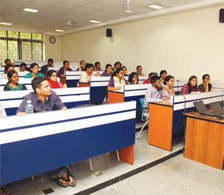
Dr. Yathindra (Team): We started incubation way back in 2002, even before it had become the fad. We are the 'anchor institute' for the Biotech Park - the 'Bangalore Helix'; besides supporting two academic institutions, that also includes the Bangalore Bio innovation Centre (BBC). In close proximity to IBAB’s 20 acres land, BBC's 59 acres are additional to its existing 10 acres. Currently about 50 acres of this land is vacant and an entire bio-tech industry is slated to come up which brings in the added scope for the BT sector.
Dr. Gayatri Saberwal: We also manage the infrastructure within IBAB and the Centre for human genome (CHG). We are incubating many companies; so far, we have incubated 20 start-ups. We had a course on entrepreneurship and are discussing and planning a mega event at IBAB in June 2017 where we hope to have around 400 bio-start ups participating in the convention. I sit on a DBT (Department of Biotechnology Committee), Govt. of India that deals with bio-incubators around the country. BIRAC (Biotechnology Industry Research Assistance Council) is a non-profit company set up by DBT and funds bio-incubators, start-up companies, academia-industry partnerships and helps promote the industry. So, we have in various ways reached out to the sector. Some of our alumni have become entrepreneurs. We do mentor if not intensively; but, if anyone comes for any help we can to an extent, help.
Dr. Yathindra (Team): We do not have a very rigorous process. It is usually someone with a Ph.D degree, but not necessarily. However, we have to alum screen and understand if this person does have the technical knowledge. And if they need our facility, then we see if we have the requisite space for them. We have research space for a limited period, usually up to three years. While we can help to incubate, these individuals pay us incubation charges.
The selection process starts with a mail to the director, then we call for a meeting and if happy, we grant a space. Earlier we gave out an entire room, then a bench and now we give half a bench, based on space availability and the high uptake of such start-ups. We haven’t done formal follow-ups on our former incubates, but we do feel we should. However, we get to hear about them and their progress such as companies like Cellworks that started out with us. You must realise that we are a very small institute with faculty strength of 10-12 professors. Most have joined in the last five years. Entrepreneurship screening is primarily done by the Director and Faculty Scientist and Dean, Academic Affairs.
Dr. Yathindra (team): We have a 2 year Masters Degree Program in Bioinformatics & Applied Biotechnology’, under the aegis of the University of Mysore with an intake restricted to up to 40 students per batch, averaging 38 or 39 per batch. IBAB conducts a national level selection process comprising of online tests and personal interviews. We roughly get 10 applicants per seat. The IBAB Ph.D programme enrols 12 students and is recognised as a Research Centre by Manipal University, Manipal, Karnataka, which awards the Ph.D degree.
We have only PG level teaching at IBAB. Even if we had Undergraduate (UG) courses; for a, richer UG education, you need faculty who do research in biosciences. One of the reasons is biosciences and related studies changes at a much faster pace. If you look at prominent nature science journals, which are trans- disciplinary, there is lot of new information coming out every day. So, if faculty were not to keep up with that, you would very soon be outdated and this affects the quality of teaching. Our mission is also to help grow the biotech industry. Informatics is only part of what we do and to help grow the industry we have 3 major activities - promoting entrepreneurship, training through education and encouraging research. So, that gives us sort of more areas to cover than delve in UG courses.
Dr. Yathindra: Initially, until the 1st semester they do go through their tough times. It is a challenge for kids but they still manage to submit papers. A student with a computer science background might have a tough pursuit for bioscience topics but they all overcome this after the 1st semester. Till date, not a single student has quit for fear or non-compliance with biology or programming modules. Today, doing biology also requires a certain amount of computer skills and bioinformatics skills, as there are huge databases. In fact, identifying a particular database which is useful, has become problem. For any particular issue, we have close to 100 databases; so to extract the most useful one becomes a challenge. Therefore there is a need for certain computational skills. So, computer literacy in terms of coding etc. helps in extracting relevant information. One of our past students, Mr.Chanchal Singh, a thorough IT guy became champion in proteomics (study of protein structures) and has half a dozen papers published in the best of medical journals and he has worked with the best companies in Germany.
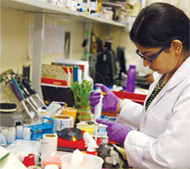
Dr. Yathindra: We train our students on how to extract from a vast database and teach a person to fish but don’t give the fish! Teach them how to go about it as the challenges keep changing as they handle multiple databases and even have to even create their own tools. We do create our own tools, our own databases. With changing and new job opportunities in the research area; today you have to do something, tomorrow something else. So our students are trained to acquire such multidisciplinary skill set.
Dr. Gayatri Saberwal: One of our students had done bioinformatics and a paper with a faculty; she beat 6 MBA candidates in securing the said job. She was the only MSc. candidate to have secured the job and the company said that this was the kind of skill they were looking for. So, it is not just in the core area of bioinformatics and biotech but our curriculum also spills over into business analytics and Business Intelligence angles too!
Dr. Yathindra (Team): We have several 100 alumni. Earlier, about 75 percent of our students went to companies because that was the main reason we were created and we are very proud of our placement record with 95 percent placement for every batch. Around 20-25 percent move on to academia while a majority of 70-75 percent join the industry. Many also opt for Ph.D programmes. Very recently the trend has switched slightly. Maybe, 65 percent join the industry and more are skewed to academia. This is because IBAB has signed a MoU with NCBS that has demanded our students for big data projects in biology. They want five students every year and that is prestigious for a small institute like ours as these are big institutes in the country and that they want our students. IISc, Bangalore too seeks our students because we impart some unique skills and this is valuable to them too.
Dr. Yathindra (Team): In a survey we did for one of the batches – we found that in a classroom, we have around 1/3 rd students from Karnataka and 2/3rd is from other states. Socio economic gaps are also wide. Two to three people per batch annually are from rural belts. While we have students from good economic backgrounds; we also have those who need 100 percent scholarships. In the last batch, some seven students received 100 percent scholarship. In the past four to five years, about 8 to 10 percent of our students annually receive some form of scholarships. The scholarship support comes from the Govt of Karnataka and also other private agencies. There is an alumni scholarship programme and the alumni also help with our placements. There is a lot of loyalty amongst our alumni. They either contribute monetarily or teach at the campus on courses lasting 1 to 10 day on Saturdays.
Dr. Yathindra (Team): Syllabus was changed three years ago. There is always a need and a wish to change but, there are certain restrictions because we have an external university recognizing our programmes. Fortunately, our failing record is very small and education here is continually updated and modified. Although syllabus per se is under the preview of the Mysore University, we can’t change the title but how we teach with relevance to today’s context is more important. That is also true for practical training and bioinformatics.
Dr. Yathindra: We have always put a limit of about 40 students, right from the beginning, because our training is very intensive that needs one on one interaction. So, we don’t want to expand on that at all. Even in our earlier curriculum under Post Graduate Diploma in Bioinformatics courses, one of the programmes had a maximum of 30-35 students and in the initial years too, our limit was 40. For our laboratory course in biotech (previous syllabus), we had only 15 students. The previous programme has now been combined in our Masters programme. We don’t want to enhance this 40 limit unless we double up on our capacity.
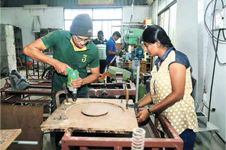
Dr. Yathindra (team): We have our unique course in terms of it being a dual degree programme that is very relevant to industry. The practical trans-disciplinary training is inclusive of students from multiple disciplines such as biology, physics, and statistics to computers. This is a very unique feature of IBAB’s education.
Prof. H. Subramanya: While we cannot compare ourselves to traditional universities like BU, IISc or IITs; as an institute we have a limited course compilation which is also specific to the industry we serve. Similarly, our research programme is much more aimed at supporting the ITBT ecosystem. Not that our research is comparable to some of the best institutes here but, certainly I would say that our research is mainly focussed on supporting ITBT and supporting that infrastructure. Primarily, we have an active entrepreneurship programme including policy decision on entrepreneurship support or incubation centre which are not really part of most academic pursuits in traditional institutions. We are not big in any one of these areas but together, we create a very unique space.
Dr. Yathindra (team): We have Rs.2.5 crore of corpuses from Infosys on a project - 'New drug target discovery and drug targeting in parasitic infections and cancer'. In 2014, the Infosys Foundation established the Infosys Chair. We have a distinguished scientist occupying that Chair and they are doing drug discovery related to Leichmaniasis, a disease more prevalent in India than in the U.S. Again, we are thankful to Dr. Kiran Mazumdar Shaw as she catalysed this for IBAB through her network. We have worked with Siemens, Phillips and Strand Life sciences that have given the industry the much need boost in areas of research and applications.
We have huge collaborations with IISc on discovery of potential drug candidate related to cancer biology. Currently, we have been testing a few potential chemicals as it stands now. It has worked well in lab culture but, we have to now test it on animals and are in the process of constructing an animal house that will be another extension of our activities. So, we have slowly grown from completely bioinformatics computational efforts to experimental.
One of our public-private partnership initiatives with Strand Life sciences has been to create the multi-crore GANIT Labs on the IBAB premises. The not- for-profit research centre has interests in analysis of big data in cancer, clinical genetics, genome analyses etc. The idea is to work in the area of genome science and use bioinformatics and computational biology tools to solve scientific problems. Strand Lifesciences market the service for the sequencing because these companies have great marketing abilities while we academicians don’t have that edge. So after 5-6 years, the whole facility becomes self sufficient –the support was given by both Dept of ITBT, GoK, and the Dept. of IT , Govt of India. Strand Life sciences have done their job and the facility will be integrated with IBAB while they will gradually withdraw. The GOK will continue to support us.
Dr. Gayatri Saberwal: Our colleague, Dr.Narayan Behera, an inventor gained a US patent 8,712,935 on 'Evolutionary clustering algorithm', a collaboration between IBAB and Philips Research, Bangalore. A publication, co-authored by IBAB faculty member, Dr. Shivakumar has resulted from collaboration with SIEMENS Corporate Research and Technologies, Bangalore. Our colleagues also collaborate with hospitals and do patient-related research. We have a pretty solid contribution to policy related research.
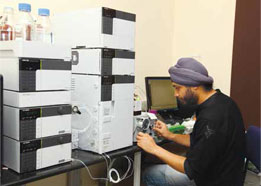
Dr. Yathindra (Team): The GoK has recently approved and requested IBAB to start a synthetic biology programme as part of curriculum. It is a question of how to make use of the biological systems to solve some of the health related problems faced by the general public. It is in the final stages of approval and grant is sanctioned for the next five years. We have to hire relevant manpower and develop the laboratory. Idea is to design pathways using naturally available biological tools and emulate nature for application in real life.
Prof. H. Subramanya: Synthetic biology a very upcoming area if you look at the global scenario. Most countries now have their own road maps for development of synthetic biology in the next 10-20 years. The future is that instead of reinventing the wheel, why not make use of something that nature is already an expert at over the last 2000 years; which we don’t have to re-invent in the next five years. IBAB with its technical know how can help generate tools and design synthetic biological pathways. We want to create those tools which can be used by various industries for synthetic biology applications. The need is also to train people in the field who can be picked up by academicians or industry for further development in the sector. The other goal is to run individual programmes that are of specific interest to any scientist joining the department - it could be in the area of environment or medicine or in areas of some chemicals which can be tapped for human well being.
By Sangeeta Ghosh Dastidar